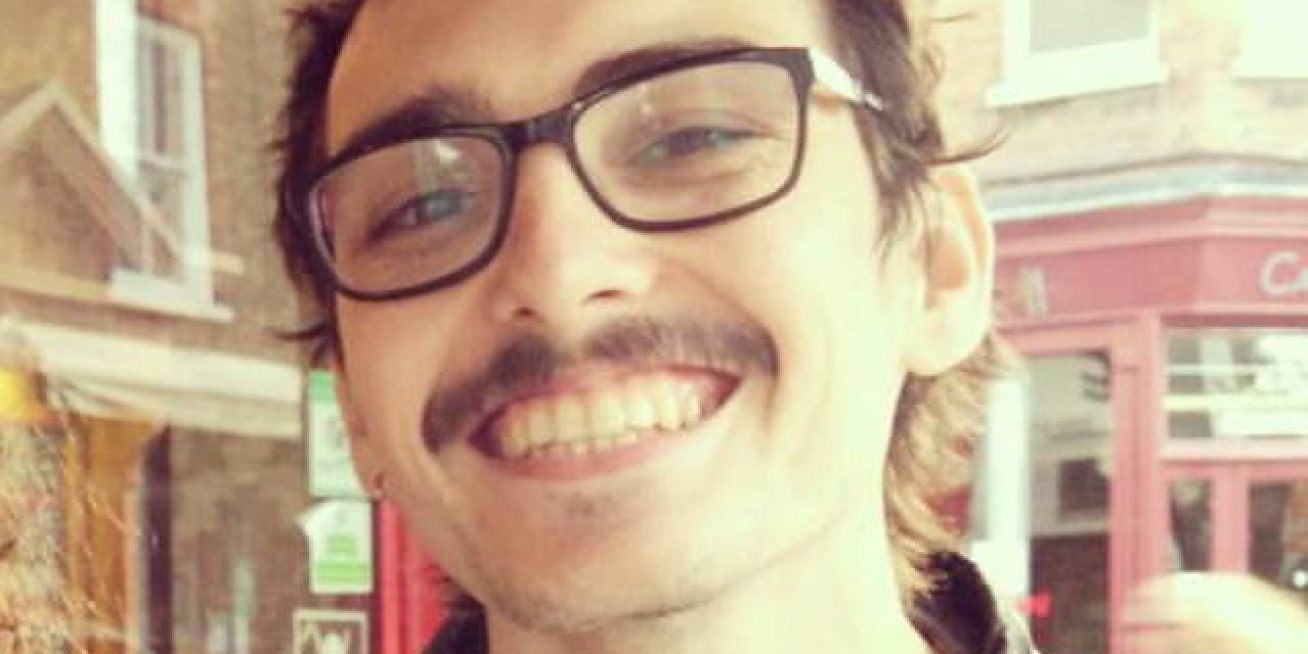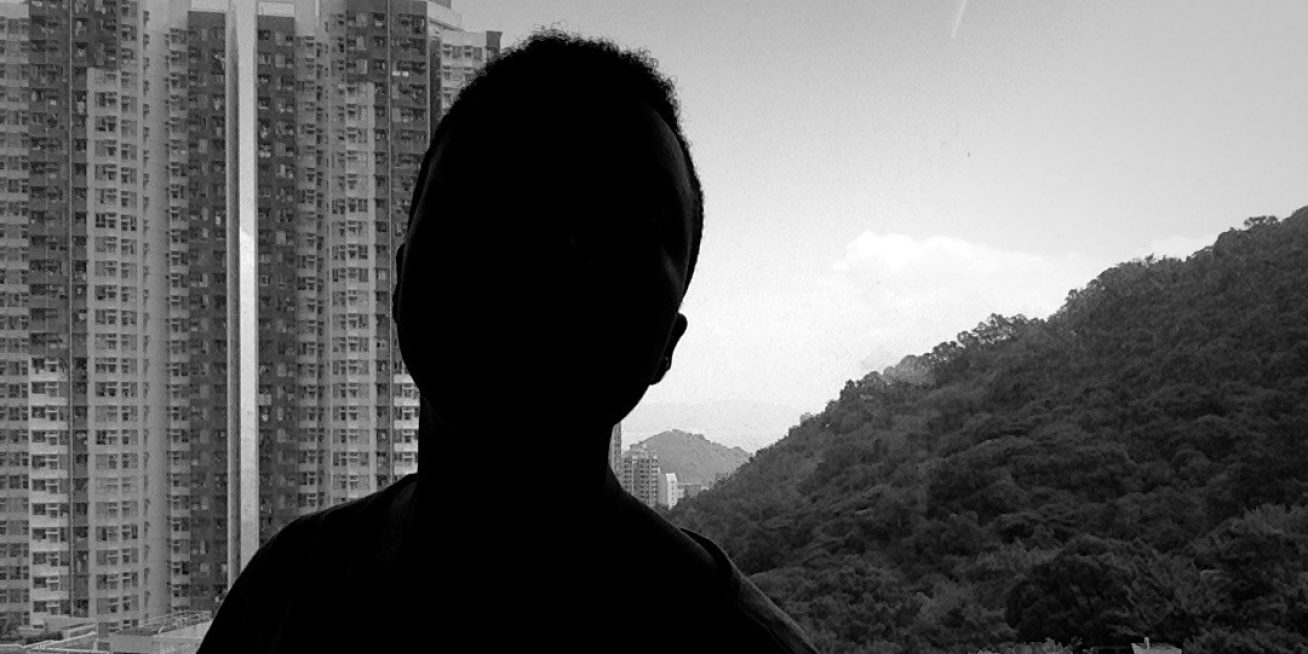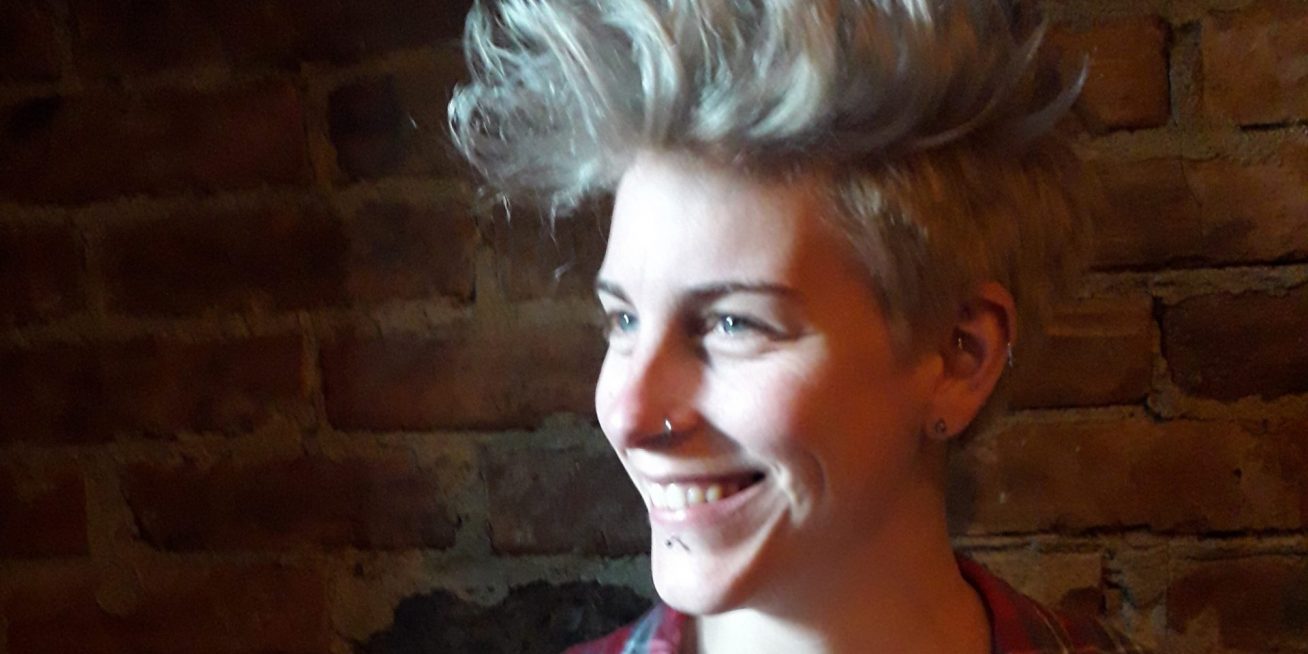Campaigning for gender neutral toilets
Riley talks about the impact of a NUS LGBT conference which led to them being part of the Trans Caucus and campaigning for gender neutral toilets.
Interview recorded by Ray Larman on 9.3.2020
Duration 08:42
TRANSCRIPT
RC: And one of the things that I did at this LGBT Conference was I met trans people and I heard them speak about their genders and identities and their experiences and I thought, 'Oh that sounds a bit familiar. I guess that means I'm trans. OK.' [laughing]. Yes, it was… that was sort of like straight into my trans identity and trans activism all in one go.INTERVIEWER: OK. Where was the conference?
RC: I'm afraid I can't remember. I went to a lot of the NUS LGBT Conferences and they were always in the sorts of hotels you expect conferences to be at. They were all a bit grotty and a bit bland and they were just overtaken by like dozens and dozens of queer students once or twice a year.
INTERVIEWER: So when you say about finding your trans identity there, was that from going to like big talks or workshops or was it from one to one conversations with people?
RC: There weren't any big talks and workshops. At that time sort of Trans Caucus – so the group just for trans people – I think would sometimes meet with maybe three or four people and that's from the whole country and there would be three or four people, three or four trans people, who may [unclear] attend the LGBT Conference. It's dramatically more than that now but at the time – yeah I mean now that was quite consistent in sort of like the mid-2000s. If there was a trans protest or trans event you would be really pleased if you had half a dozen people there because that's how small the community was at the time. And so it was very much like one-on-one conversations with a handful of people. I won't name them because I haven't asked them, but they, they know who they are.
And we were sort of as a group looking for ways that sort of other LGBT, other LGB students would be able to support trans students on campus, ways that would be able to sort of get trans issues on the radar on campuses, and get people to, to make a practical difference for those trans individuals but also to sort of point out to the university staff, other students that there are trans people sort of living amongst them.
And we decided to campaign for gender neutral toilets on campuses and I think if, you know, things have changed a lot in the last ten years but we've probably... it's amazing now I'll go to places and there are will be gender neutral toilets and I'll go 'Oo that's exciting! That's me! That's really pleasing'. That did not happen in 2005-2006. There were… it was unheard of.
INTERVIEWER: So tell me how that started. If that was your campaign what did you do? And what reactions did you get?
RC: So there was a little group of us from NUS LGBT so we were at different universities. So there were two of us from Bradford, two people from Warwick, one person from Manchester. There weren't very many trans people involved in student campaigning at the time so were, were quite spread out but once we found each other we sort of clung to each other.
And so we – in Student Union politics typically what you do is you get a union, Student Union, to pass a motion in support of something and that motions says, get them to say they believe something and that they are going to do something. So we decided to write a standard motion that then other Student Unions could pass so that other activist groups would be able to sort of like get that, see that, see that they'll start, see that that campaign in other campuses as well as the ones where we studied. And so we wrote a policy. And it was reflective of the politics of the time [laughs]. But it wasn't... it's not dreadfully dated but, yeah it was basically talking about our best guess as to the prevalence of trans people and the difficult experiences that people have accessing gendered spaces when out in public, and also the sort of harassment and assaults that people sometimes experience when they’re using gendered spaces that people don't think they've got a right to.
And we asked for the Student Union to provide gender neutral toilets and to campaign for the university to do the same. And it passed. There [unclear]
INTERVIEWER: [unclear interruption] true?
RC: At Bradford.
INTERVIEWER: It passed at Bradford. OK, so that wasn't at national level that was just at Bradford?
RC: So what happened, we got it passed at Bradford first and then we took that to the NUS LGBT Campaign and said NUS LGBT Campaign should campaign for all campuses and universities to follow Bradford's example. And they agreed [laughs].
INTERVIEWER: OK
RC: And then, so then me and other people who were involved in it would go to other campuses and usually do a little talk and either to the Students Union or to the LGBT Society and explaining why it's important. And hopefully try and help them to pass it as well.
INTERVIEWER: Did you meet any resistance? I have to ask that.
RC: I did meet resistance. Lots of people thought it was a niche issue that didn't matter; because there's hardly any trans people so why bother? Lots of people who, yeah, wanted to have sort of spaces just for women and just for men and didn't really consider the fact that that might be problematic for anyone. There were some people who didn't want us to cause a fuss because it might draw attention to the fact that people are sort of using gendered spaces in a way that best fitted them and they didn't want to be forced to use a third gendered space, which obviously that was not our intention and it's not, that is not the purpose of gender neutral toilets.
So we, yeah we did LGBT Societies. There was some resistance around sort of like it being, yeah it being seen like a niche issue and sort of obviously more widely there was all the transphobia that you might expect any trans campaign to experience.
INTERVIEWER: So then in practical terms at Bradford what happened after that? Like how quickly did you get gender neutral toilets?
RC: Yeah, in practical terms, straight away all that really happened was that any stalls that were already single-stall were re-labelled. But then we got it written into the policy that any new-builds or refurbishments would have to create gender neutral provision so there would have to be three options for toilet blocks. And yeah, so gradually over time as things have been re-fitted and refurbished that provision has increased dramatically.
INTERVIEWER: So what other, what other campaigns were you involved in then at Bradford? Was that the main one?
RC: Yeah that was one of the main ones. So that was when it later trans issues of [unclear] as well.
INTERVIEWER: OK
RC: So at the time, the sign, it was basically me on my laptop trying to make a sign that, for them to print up and, print out and stick up. I was probably the only one to actually, I was literally there with my Blu-tac stickering, covering up the door signs. And at the time it was very much talking about gender neutral toilets and it had an explanation of what and why and went into quite a lot of detail. And that was relevant to the time because this was a new thing that nobody had ever heard of. There weren't any gender neutral toilets unless they were coincidentally gender neutral. And I think that was the right choice for the time.
Nowadays gender-neutral toilets are so much more common and what I really personally like nowadays is to go to somewhere and see a sign that says 'Toilets' and for there to just to be single-stall toilets that have no gender markers whatsoever and there is no song and dance about the fact that they're gender neutral. They just are the toilets that are available to everyone and accessible to everyone and so anyone can use them.






